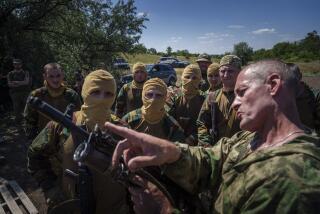Few Soviet Troops Seen as Patrols Begin : Military: Gorbachev’s decision to add soldiers to police beats raised fears of conflict and crackdown. The first day is uneventful.
- Share via
MOSCOW — Two shivering 19-year-old Soviet soldiers flanking a policeman patrolled an underground walkway near Red Square Friday, as a controversial decree authorizing troops to patrol city streets went into effect.
The decree has brought Soviet President Mikhail S. Gorbachev into a new conflict with several of the country’s constituent republics, which denounced the patrols as an imposition of undeclared martial law and a step toward dictatorship.
But to Oleg and Nikolai, the two conscripts on patrol, the new decree meant that they had to walk a beat beneath the street near the Kremlin, spending hour after hour in subzero temperatures Friday evening.
The policeman with whom they were patrolling wore a thick sheepskin coat, but the tall young soldiers had only their wool army coats.
“I’m not so cold,” Oleg, of Tolyatti, who refused to give his last name, said as his teeth chattered. “We’re here to fulfill our orders--there’s nothing unusual about that. I guess it’s necessary or they wouldn’t make us do it.”
Despite the controversy since the patrols were announced a week ago, the first day appeared to pass uneventfully across the country.
Very few soldiers were seen on the streets of Moscow, the Soviet capital, but authorities said that about 540 would be deployed initially to patrol 100 routes, mostly heavily traveled places or places where crime is common, in the city’s 30 districts.
Journalists in several other large cities, including Leningrad, Kiev, Tbilisi, the capital of the southern republic of Georgia, and the capitals of the three Baltic republics, said that no soldiers had been seen on the streets. There were no reports of violence.
Yet, there was a spontaneous debate in the small crowd that gathered in the underground passage to watch the patrol walk back and forth on its crime-prevention mission.
“Soldiers haven’t patrolled the streets for 20 years,” a rotund, middle-aged Muscovite said. “They want to bring us back to the old days of totalitarianism.”
But Nikolai M. Sigorov, 36, a policeman for 15 years, was not impressed with such arguments.
“This is just another excuse for them to shoot off their mouths,” Sigorov said. “The police need reinforcements now because crime has really gotten worse. Imagine what it’s like to be a lone policeman trying to control a drunken brawl at a restaurant. It will be much easier with some helpers.
“Besides, soldiers have always been called in to help the police in emergencies. This just makes it more routine.”
Boris K. Pugo, the Soviet interior minister, said that the troops were needed to help police fight rising urban crime but that they would be deployed only with the permission of elected regional governments.
In an attempt to calm fears that young soldiers would be opening fire with their rifles on city streets, other officials said that generally they would not be armed except for the knives that are part of their uniforms.
But Oleg and Nikolai had no weapons at all. “Look at me--I have nothing,” Oleg said, lifting his hands over his head.
Political reformers across the country had expressed fears that the patrols were intended to crack down on liberals and national independence movements. Their leaders warned that putting troops on the streets in such tense times could spark clashes between soldiers and civilians such as those in the Baltic republics last month that killed 21 people.
Russian President Boris N. Yeltsin and the legislature of the Russian Federation, the country’s largest republic, declared the decree “unconstitutional” in a decision signed Friday and started legal proceedings to have it overturned.
“The use of armed servicemen can lead to the destabilization of the political situation and curtailment of rights and freedoms,” Yeltsin said.
The patrols are unacceptable because, “if the military is drawn into the present struggle, it could lead to a civil war,” Yeltsin told a legislative seminar, according to the independent Interfax news agency.
More to Read
Sign up for Essential California
The most important California stories and recommendations in your inbox every morning.
You may occasionally receive promotional content from the Los Angeles Times.










